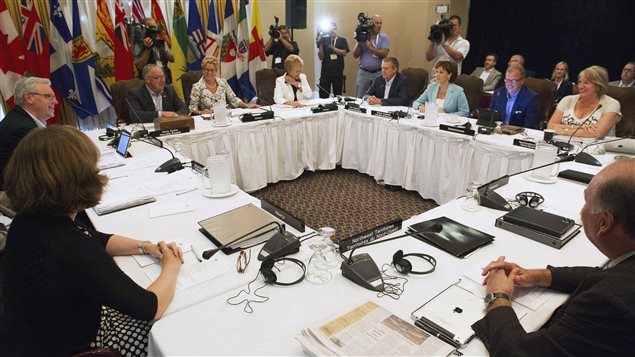TransCanada Corp. says it has garnered significant support for its quest to ship Western crude to refineries in the East, as premiers seek consensus on a politically charged cross-country pipeline.
The Calgary-based company told The Globe and Mail it has received major backing from producers who want to ship crude on its Energy East pipeline, and will make an announcement in the coming weeks.
Canada’s premiers will discuss the proposed pipeline – which has been championed by Alberta and New Brunswick – at the Council of the Federation this week in Niagara-on-the-Lake, Ont.
The discussions take place as Quebec Premier Pauline Marois grapples with the fallout from the catastrophic train derailment in Lac-Mégantic, which has raised questions about the safety of transporting oil.
Alberta Premier Alison Redford and New Brunswick’s David Alward will highlight the proposal as a nation-building project as the premiers gather for the annual meeting.
A formal agreement is not expected, according to industry and political sources.
Quebec has been wary of speaking out about the pipeline so soon after the fatal explosion, according to a source in one of the other premiers’ offices who spoke to The Globe on condition of anonymity.
But Quebec remains supportive behind the scenes, the source said.
The Energy East project would carry as many as 850,000 barrels per day of crude from Alberta to Quebec and Saint John, for domestic refineries and for export.
Alberta’s proposed national energy strategy is a key item on the agenda for the meeting. At the premiers’ meeting last year, Ms. Redford bickered with British Columbia’s Christy Clark over Ms. Clark’s opposition to the proposed Northern Gateway pipeline, which would transport 500,000 barrels per day of crude across B.C. for export terminals at Kitimat.
Ms. Marois has said little publicly about the Energy East proposal, though Ms. Redford and Mr. Alward have met with her in the past and described her as supportive. “We really do see the work that’s gone on with respect to Energy East as a great example of why a Canadian energy strategy matters,” Ms. Redford told The Globe on Wednesday.
“We as premiers have been able to see the importance of having an integrated infrastructure project that can move resources from Western Canada to ports. And, of course, that’s a great economic benefit to Quebec and New Brunswick – it creates jobs and opportunity.”
The Premier said she will have further conversations with Ms. Marois, but the project now hinges on commercial and regulatory decisions. Mr. Alward is expected to discuss the project with the Quebec Premier this week. A spokesperson for Ms. Marois declined to comment.
The pipeline company – which has been stalled in its plan to build the Keystone XL line from Alberta to the U.S. Gulf Coast – has not finalized its decision, but there is every indication that it will proceed and will file for regulatory approval before the end of the year.
Alberta has committed to ship crude that the province receives from producers in lieu of cash royalty payments, and oil-sands giant, Cenovus Energy Inc., confirmed Wednesday that it has signed up as a shipper.
“We are very optimistic about the project,” Alex Pourbaix, TransCanada’s president for energy pipelines, said in an interview. While the company gave producers the option of delivering only to Quebec, many want access to the refinery and deep-water port in Saint John.
“We weren’t sure we were going to get sufficient commercial support to underpin the required facilities but as we’ve gone through the bids, it’s gratifying to see that our shippers see that similar value propositions. So we’re ultimately feeling pretty confident about the opportunity to continue going east of Quebec.”
Mr. Pourbaix said the company will work to assure Quebeckers – and other communities along the route – that the pipeline will be safe.
“Pipelines have proven to be an extraordinarily safe and reliable method of moving all kinds of energy over the past 80 to 100 years,” he said, adding his company has an “industry-leading track record on safety and the environment.”
Even though the Lac-Mégantic disaster involved oil-carrying rail cars rather than pipelines, Quebeckers could still oppose the project over safety concerns.
“I really doubt the project can be approved in Quebec,” said Pierre-Olivier Pineau, an energy expert at HEC Montreal business school. Mr. Pineau noted that Enbridge Inc. has run into vocal opposition with its proposal to reverse the flow of an existing pipeline to supply two refineries in the province with western oil, but that project will likely proceed.
“If ever TransCanada says they want to get the right-of-way and build a new pipeline in Quebec, there will be so much opposition, the same kind of opposition we’ve seen in B.C.,” he said. “No premier in Quebec will be able to defend that project.”
TransCanada touts major backing as premiers to discuss west-east pipeline
























Laissez un commentaire Votre adresse courriel ne sera pas publiée.
Veuillez vous connecter afin de laisser un commentaire.
Aucun commentaire trouvé